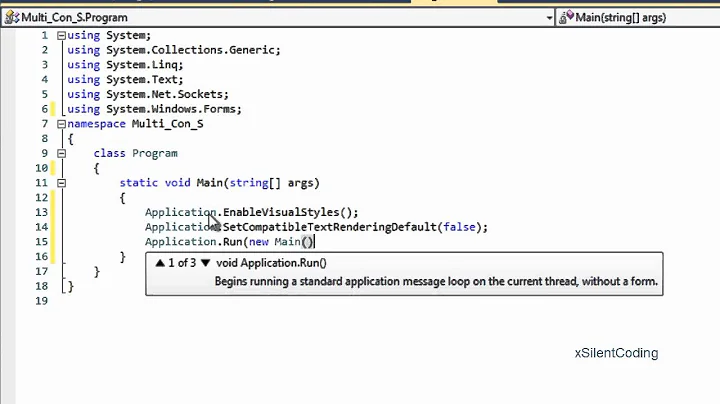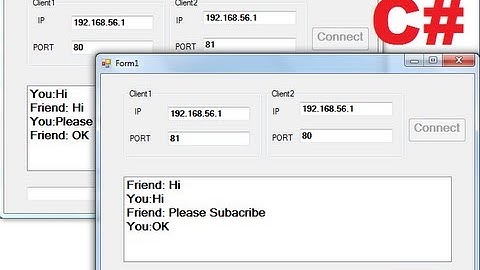How to abort socket's BeginReceive()?
Solution 1
It seems like this is by (the very dumb) design. You must have this exception thrown and caught in your code.
MSDN looks silent about it indeed, but if you look at the documentation of another asynchronous socket method, BeginConnect(), here's what we find:
To cancel a pending call to the BeginConnect() method, close the Socket. When the Close() method is called while an asynchronous operation is in progress, the callback provided to the BeginConnect() method is called. A subsequent call to the EndConnect(IAsyncResult) method will throw an ObjectDisposedException to indicate that the operation has been cancelled.
If it is the proper way of doing for BeginConnect, it is probably so for BeginReceive as well. This is certainly a poor design on the part of Microsoft's async API, because making the user necessarily throw and catch exception as a part of a normal flow would annoy the debugger. You have really no way to "wait" until the operation is completed, because Close() is what completes it in the first place.
Solution 2
I am surprised no one recommended using SocketOptions.
Once the stack has the send or receive operation it is bound by the socket options of the socket.
Use a small send or receive timeout and use it before the operation so you don't care if it's changed during that same operation to something shorter or longer.
This will cause more context switching but will not require closing the socket under any protocol.
For example:
1) Set a small timeout
2) Perform operations
3) Set timeout larger
This is similar to using Blocking = false but with an automatic timeout that you specify.
Related videos on Youtube
Day_Dreamer
Electrical engineering and Physics student, interested in programming
Updated on August 07, 2021Comments
-
 Day_Dreamer almost 3 years
Day_Dreamer almost 3 yearsNaturally,
BeginReceive()will never end if there's no data. MSDN suggests that callingClose()would abortBeginReceive().However, calling
Close()on the socket also performs aDispose()on it, as figured out in this great answer, and consequentlyEndReceive()would throw an exception because the object is already disposed (and it does!).How should I proceed?
-
SwDevMan81 over 13 years
-
-
Kelly about 12 yearsCan't believe it's built to work like this but it is what it is I suppose.
-
supercat about 10 years@Kelly: What's wrong with it as a design? Code which calls
EndReceivewill need to handle failures regardless of whether an exception is thrown or not. If the condition can be handled right at theEndReceive, not having it throwing an exception would allow acatchto be replaced with anif, but if it can't be handled then, one would have to addif ( [it failed] ) throw [something]and would still need a catch. Connections shouldn't be aborted often enough for the performance overhead of using an exception vs anifto matter. -
Pavel Radzivilovsky about 10 yearsBecause throwing and catching an exception as a part of a normal input, as opposed to an 'exceptional' flow, is a bad design regardless of performance implications. It may also annoy debugging under "break on throw" settings which is often useful.
-
 Tom Heard almost 10 yearsThis doesn't work if he wants to abort AFTER calling BeginReceive. Given BeginReceive creates an Asynchronous callback, it will have that Asynchronous callback waiting until there is data to receive. What if he wants to abort after calling BeginReceive but before the Async callback executes (which is what his question is suggesting)? Your solution wouldn't work in this case.
Tom Heard almost 10 yearsThis doesn't work if he wants to abort AFTER calling BeginReceive. Given BeginReceive creates an Asynchronous callback, it will have that Asynchronous callback waiting until there is data to receive. What if he wants to abort after calling BeginReceive but before the Async callback executes (which is what his question is suggesting)? Your solution wouldn't work in this case. -
 Tom Heard almost 10 yearsTherefore Exception handling is needed in the OP's case, as the only way to Abort the asynchronous callback is to close the socket. Which will cause an ObjectDisposedException to be thrown on EndReceive.
Tom Heard almost 10 yearsTherefore Exception handling is needed in the OP's case, as the only way to Abort the asynchronous callback is to close the socket. Which will cause an ObjectDisposedException to be thrown on EndReceive. -
 Jay over 9 yearsa lot of things are dumb in .Net, StreamReader, BinaryReader, (leaveOpen, DiscardBufferedData...) The ASync and Begin methods really just wrap the logic of Send and Receive in most anyway so in this case as most others the synchronous operation has to be cancel-able to support such a concept.
Jay over 9 yearsa lot of things are dumb in .Net, StreamReader, BinaryReader, (leaveOpen, DiscardBufferedData...) The ASync and Begin methods really just wrap the logic of Send and Receive in most anyway so in this case as most others the synchronous operation has to be cancel-able to support such a concept. -
 Jay over 9 yearsThey could also use a wait handle or event. They could also could use options as I indicated in my answer. This requires another socket per client and server.
Jay over 9 yearsThey could also use a wait handle or event. They could also could use options as I indicated in my answer. This requires another socket per client and server. -
Michael Wojcik almost 7 yearsThe socket send/receive timeout options only apply while a blocking I/O operation is in progress. I haven't looked at how the Framework's async I/O is implemented, but I'm hoping it's with an actual async mechanism such as WSASelect or I/O completion ports, and not some thread sitting in a blocking operation.
-
Christopher Pisz over 6 yearsYou realize these async sockets are within a multithreaded program right? You can check on one line in thread A and the execution then can close in thread B, then back in thread A your condition is out the window.





